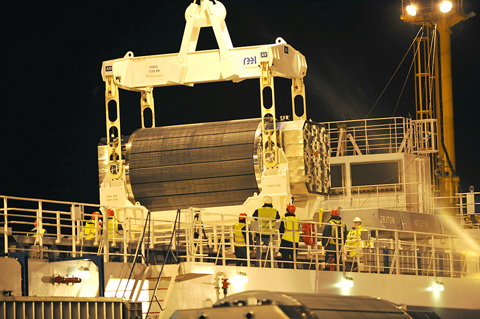French nuclear group Areva early yesterday started loading a major shipment of recycled fuel onto a ship that was to head for Japan, despite fears it could be hijacked and used in bombs.
Environmental group Greenpeace said it was “the biggest cargo of fissile material ever transported.”
The loading of the specially adapted Pacific Heron began in the northwestern port of Cherbourg in the early hours of yesterday, shortly after the ship’s arrival.

PHOTO: AFP
The convoy of recycled nuclear fuel had moved under police escort on Wednesday to Cherbourg to be shipped halfway round the world to Japan. A second convoy arrived early yesterday.
The mixed oxide (MOX) is a blend of plutonium and reprocessed uranium that Japan, which has virtually no natural energy resources of its own, wants to start using as nuclear fuel.
Areva insists the production of MOX is safe and that it helps reduce nuclear waste. Industry players say the risk of the civilian-grade plutonium contained in MOX being extracted to make atomic weapons is negligible.
But Greenpeace has asked the UN nuclear watchdog, the International Atomic Energy Agency, to stop the shipment of “an extremely dangerous and proliferating substance,” saying it is “unsafe and unnecessary.”
It says the recycled fuel to be sent to Japan contains 1.8 tonnes of plutonium, theoretically enough to make 225 nuclear bombs, making it the biggest plutonium transportation in history.
Greenpeace had unsuccessfully tried to block the last French MOX convoy to Japan in 2001.
Areva has confirmed the shipment is being prepared, but not its exact size, nor when it would leave for Japan.
MOX has been used as fuel in several countries across the world for more than three decades.
The nuclear fuel reprocessed by Areva came from three regional Japanese power companies and is intended for use at light-water reactors in southern and central Japan.
Japan, which relies on nuclear power plants for nearly a third of its power demands, has also built its own reprocessing plant, which is expected to begin operating soon.

Kehinde Sanni spends his days smoothing out dents and repainting scratched bumpers in a modest autobody shop in Lagos. He has never left Nigeria, yet he speaks glowingly of Burkina Faso military leader Ibrahim Traore. “Nigeria needs someone like Ibrahim Traore of Burkina Faso. He is doing well for his country,” Sanni said. His admiration is shaped by a steady stream of viral videos, memes and social media posts — many misleading or outright false — portraying Traore as a fearless reformer who defied Western powers and reclaimed his country’s dignity. The Burkinabe strongman swept into power following a coup in September 2022

‘FRAGMENTING’: British politics have for a long time been dominated by the Labor Party and the Tories, but polls suggest that Reform now poses a significant challenge Hard-right upstarts Reform UK snatched a parliamentary seat from British Prime Minister Keir Starmer’s Labor Party yesterday in local elections that dealt a blow to the UK’s two establishment parties. Reform, led by anti-immigrant firebrand Nigel Farage, won the by-election in Runcorn and Helsby in northwest England by just six votes, as it picked up gains in other localities, including one mayoralty. The group’s strong showing continues momentum it built up at last year’s general election and appears to confirm a trend that the UK is entering an era of multi-party politics. “For the movement, for the party it’s a very, very big

ENTERTAINMENT: Rio officials have a history of organizing massive concerts on Copacabana Beach, with Madonna’s show drawing about 1.6 million fans last year Lady Gaga on Saturday night gave a free concert in front of 2 million fans who poured onto Copacabana Beach in Rio de Janeiro for the biggest show of her career. “Tonight, we’re making history... Thank you for making history with me,” Lady Gaga told a screaming crowd. The Mother Monster, as she is known, started the show at about 10:10pm local time with her 2011 song Bloody Mary. Cries of joy rose from the tightly packed fans who sang and danced shoulder-to-shoulder on the vast stretch of sand. Concert organizers said 2.1 million people attended the show. Lady Gaga

SUPPORT: The Australian prime minister promised to back Kyiv against Russia’s invasion, saying: ‘That’s my government’s position. It was yesterday. It still is’ Left-leaning Australian Prime Minister Anthony Albanese yesterday basked in his landslide election win, promising a “disciplined, orderly” government to confront cost-of-living pain and tariff turmoil. People clapped as the 62-year-old and his fiancee, Jodie Haydon, who visited his old inner Sydney haunt, Cafe Italia, surrounded by a crowd of jostling photographers and journalists. Albanese’s Labor Party is on course to win at least 83 seats in the 150-member parliament, partial results showed. Opposition leader Peter Dutton’s conservative Liberal-National coalition had just 38 seats, and other parties 12. Another 17 seats were still in doubt. “We will be a disciplined, orderly